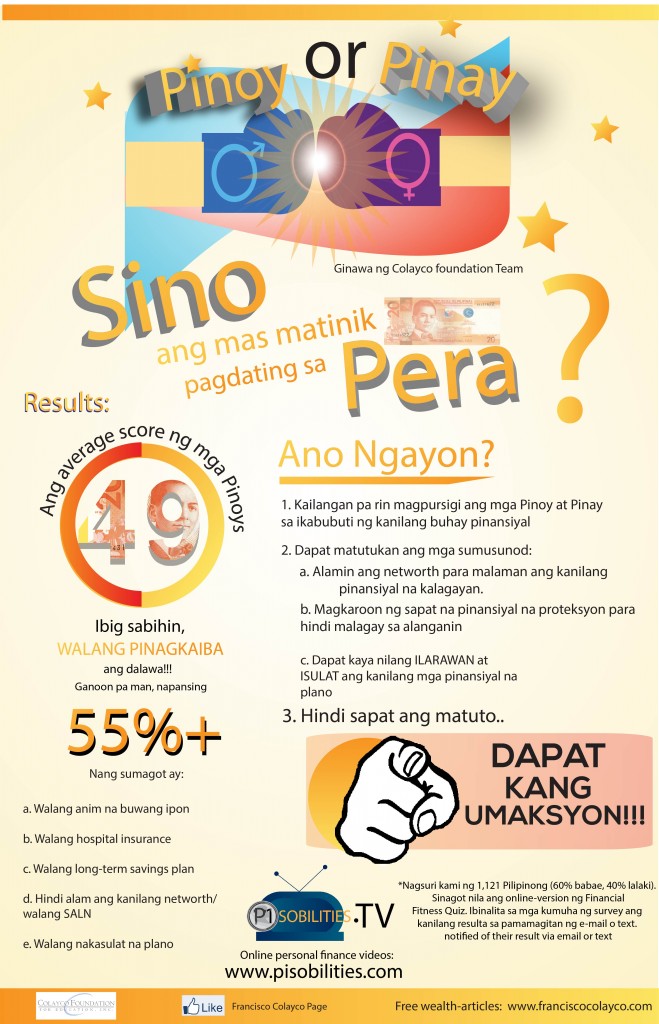ni: Francisco J. Colayco
unang lumabas sa Bulgar noong ika-30 ng Hunyo, 2010
HINDI garantisado ang tubo sa mutual funds. Sa katunayan, puwede pa ngang bumaba ang halaga ng investment mo. Pero kung susundin mo ang ilang simpleng patakaran, napakaliit ng tsansa na matalo ka. Tandaan na sa Mutual Funds, hindi ka kumikita o nawawalan ng pera hangga’t hindi mo binebenta ang shares mo.
Mahalagang maunawaan na puwede mong ibenta ang iyong shares anumang oras at tiyak na may bibili nito. Sa ibang uri ng investment, puwedeng maging mahirap ang paghahanap ng buyer lalo na tuwing panahon ng emergency.
Ang pangunahing patakaran ay ang mga sumusunod:
1.) Piliin lamang ang mga pinagkatitiwalaan at kilalang mutual funds. May inaalagaang reputasyon ang mga kilalang kumpanya at napakalayong mangyari na ipapaubaya nila ang kanilang mutual fund sa mga fund manager na hindi mahuhusay. Pero siyempre, kahit ang mga kilalang pangalan ay puwede pa ring magkamali. Kung kaya puwede pa ring protektahan ang sarili sa pamamagitan ng mga sumusunod na patakaran.
2.) Pumili sa mga pangunahing uri ng mutual funds: Equity Fund, Bond Fund, Balanced Fund. Piliin kung alin ang angkop sa iyong personal na planong pinansiyal (kailangang may malinaw kang plano bago mo man lang isiping mag-invest). Sa bawat uring nabanggit, ang mga fund na may mas mataas na paglago sa mga nagdaang taon ay may mas mataas na tsansang maging matagumpay pati sa hinaharap.
3.) Ikalat ang iyong panganib. Huwag ilagay lahat ng savings sa mutual funds. Hinihikayat ko kayo na i-invest na lang ang mga halagang gagastusin sana sa mga bagay na walang halaga. Sa halagang Php 35.00 kada araw, makakaipon ka ng Php 1,000.00 sa isang buwan. Kung sumali sa isang Equity Mutual Fund na karaniwang lumalago nang 15% kada taon, ang Php 1,000.00 kada buwan (na dagdag sa Php 5,000.00 na panimulang hulog sa mutual fund) ay magiging Php 238,000.00 sa loob ng 10 taon. Pero sa loob ng 120 buwan na ito, ang inilabas mo lang na pera ay Php 125,000.00. Sa loob ng 20 taon, ang pera mo ay magiging Php 1,409,000.00 kahit na Php 245,000.00 lang ang inilabas mo.
Kung ang panimulang requirement na Php 5,000.00 ay ang kabuuan ng lahat ng inyong savings, mag-isip nang mabuti bago mag-invest. Kung sa susunod na 3-5 taon ay wala naman kayong mahigpit na pangangailangan para sa savings, puwede n’yo nang subukan ang investing. Kung may biglang pangangailangan at mapipilitan kang ibenta ang iyong shares, may posibilidad na malugi ka nang kaunti pero maliit lang ang posibilidad na maubos ang iyong investment.
4.) Magtalaga ng target para sa sarili mo. Sabihin na nating gusto mong kumita ng 20% sa loob ng isang taon. Kapag naabot mo na ito, ibenta mo na ang ilang bahagi ng iyong shares upang makuha mo ang tubo, pero huwag mo na galawin ang original na halaga ng iyong investment. Kung piliin mong huwag magbenta, pwedeng bumaba lang ang iyong average return on investment.




